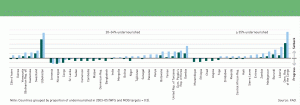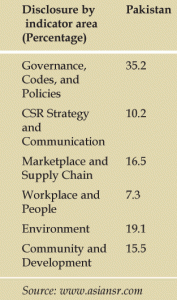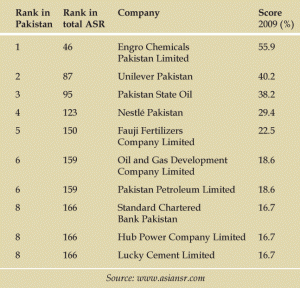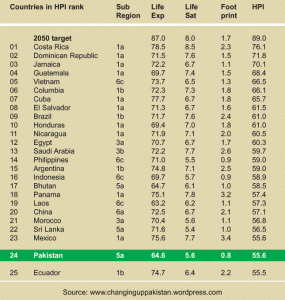All this talk of CSR. But as a citizen, stepping back and looking at the state of our beloved nation, one wonders how CSR can be relevant to people whose daily lives are riddled with bombings, muggings, conspiracy theories and a whole array of similarly unpalatable pickings. Indeed, we at tbl glimpse rays of hope through corporate responsibility.
This article examines Pakistan’s ranking in various indices. Perfect or flawed, these rankings are used to judge us as a ‘people’ so until we set our own parameters and create our own indices, let’s unearth what truth there is about us in these. The indices below cover a broad range of issues reflecting the country’s economic and social well-being. The article goes on to discuss how companies can inculcate CSR into their core business models to contribute towards a more pleasant Pakistan – for all.
FAO Malnutrition Ranking
A vast majority of the world’s undernourished people live in developing countries, which are home to 832 million chronically hungry people, according to a 2003 – 2005 survey by the Food and Agriculture Organization (FAO). Of these people, 65 percent live in the following seven countries: India, China, the Democratic Republic of the Congo, Bangladesh, Indonesia, Pakistan and Ethiopia.
Progress in these countries with large populations obviously has an important impact on the overall reduction of hunger in the world. Among these, China has made significant progress in reducing undernourishment following years of rapid economic growth. In Pakistan, however, where the majority of the population lives below the poverty line, malnutrition is on the rise. The analysis confirms the negative impact of soaring food prices, especially on the poor and the vulnerable. These soaring food prices call for a need for CSR initiatives for agri-based and food companies which can be driven in the right direction for Pakistan.
According to the latest Transparency International (TI) corruption report, which based its ranking on data from country experts and business leaders at 10 independent institutions, including the World Bank, Economist Intelligence Unit and World Economic Forum, there has been an increase in corruption in Pakistan since 2008 with its ranking moving up to number 42 in the list. The top-ranked country was New Zealand with a score of 9.4, followed by Denmark at 9.3, and Singapore and Sweden, both on 9.2.
CSR practices build on a foundation of transparency and disclosure. Good governance practices in CSR inevitably will have a positive effect on the governance-related practices of the government itself. A point that companies might prefer to argue – but from the CSR lens, this is the least we’d like to believe.
Disclosure in Pakistan is generally poor with only three companies making it into the top half of the overall Asian Sustainability Rating (ASR). What is perhaps most surprising in the context of large listed companies in Pakistan is that there exists a large number of subsidiaries of Western multinational corporations, that are nevertheless consistently poor at providing meaningful information to their stakeholders.
International Versus Developing Country Disclosure
This implies an oft-cited allegation that multinationals have sophisticated policies and systems relating to CSR in their home countries; however, this does not necessarily translate into the same level of practice in the developing countries where they operate, as in these countries stakeholder pressure is not as significant.
Less than one in five companies provide any information on the environment, supply chains and community development issues that are particularly important in the context of social and economic growth for a developing country such as Pakistan.
Human Development Index
Another Index which is relevant from the CSR perspective is the Human Development Index (HDI). The HDI looks beyond GDP to a broader definition of wellbeing. The HDI provides a composite measure of three dimensions of human development: living a long and healthy life (measured by life expectancy), being educated (measured by adult literacy and gross enrolment in education) and having a decent standard of living (measured by purchasing power parity and income).
Between 1980 and 2007 Pakistan’s HDI rose by 1.30 percent annually from 0.402 to 0.572 today, which gives the country a ranking of 141 out of a total of 182 countries. But according to the World Bank (WB), there has been a decline in poverty by 5.1 percent in Pakis-tan, from 22.3 percent to 17.2 percent (of the total population).
With progressive steps being taken one can say that there is light at the end of the tunnel. But to ensure that the light isn’t caused by an approaching train, appropriate measures need to be taken on a holistic basis.
The Minister of Corporate Affairs Salman Khurshid, in India is working on a code that will require all profit-making companies to set aside an amount proportionate to their turnover or profits for CSR initiatives. According to him, companies may even be extended fiscal relief for their involvement in CSR initiatives.
In order to develop human resources and raise the literacy level in the country, a report titled ‘New Trends in International Student Mobility’ by the UNESCO Institute for Statistics, offers valuable learnings.
According to this report, only 15 countries account for 44 percent of the world’s mobile students. There is huge potential for large corporations in Pakistan to contribute towards the development of the education sector in Pakistan. One of the ways these corporations can contribute to increasing the education and skill levels of their employees is by sponsoring relevant courses and education for deserving employees and helping them attain the kind of learning that comes from international exposure. This will begin a technology transfer at a micro level that will slowly spread by the employees implementing their learnings in Pakistan via their companies.
A notable example is the Adult Literacy Program (ALP), an initiative of National Foods Limited (NFL), which imparts education to semi-literate and illiterate labour force of the company.
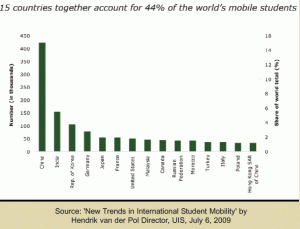
Source: 'New Trends in International Student Mobility' by Hendrik van der Pol Director, UIS, July 6, 2009
Another excellent HR initiative for CSR which can be replicated is ‘Intrapreneurism’. Through this initiative, the company encourages ‘intrapreneurs’ or employees who have ideas that could potentially become a venture, and most of these intrapreneurs end up directing their own projects and ventures. Some companies which promote intrapreneurship include Adobe, India Inc, KPMG, Microsoft, NIIT and Pepsi.
Happy Planet Index
An index that has been open to a lot of discussion lately is the Happy Planet Index (HPI), calculated by life expectancy, life satisfaction, and ecological footprint. Pakistan ranks number 24 in the world according to a study conducted by the New Economic Foundation. This is the first index which “combines environmental impact with well-being to measure the environmental efficiency with which …, people live long and happy lives.” However, despite the blaring media headlines stating “Costa Rica: World’s Happiest Place,” HPI does not really reveal whether countries are “happy”. In fact, the nations that rank the highest on this index are in fact not the happiest in the world, but are those which show that “achieving, long, happy lives without over-stretching the planet’s resources is possible”.
Pakistan has a negative ranking in the various indices. Inspite of it being ranked number 10 in the top 10 failed states index, there is still hope. There is an increased understanding and awareness among companies and individuals of the need for CSR and its significance for sustainable economic development. They say that the first step towards change is awareness. There is a critical need for all stakeholders government bodies, corporations, businesses, and individuals to collectively make a determined effort and take solid steps to contribute to the economic and social well-being of the country.


